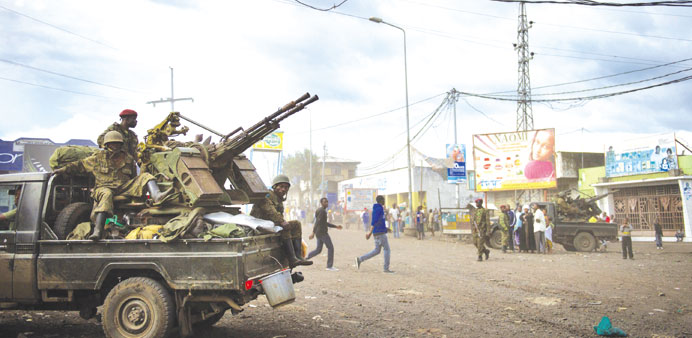This November 2012 picture shows Congolese government soldiers at the back of a pick-up truck mounted with an anti-aircraft gun in the city of Goma, in eastern Democratic Republic of the Congo. The UN Security Council has unanimously approved the first-ever ‘offensive’ UN peacekeeping brigade to battle rebels in the Congo.
AFP/United Nations
The UN Security Council has unanimously approved the first-ever “offensive” UN peacekeeping brigade to battle rebels in the Democratic Republic of the Congo (DRC), which hailed the move yesterday as a turning point for its restive east.
A council resolution gave the 3,000-strong force orders to “neutralise” and “disarm” rebel groups in the resource-rich east of the country, which has been gripped by conflict for more than two decades.
Congo Prime Minister Augustin Matata Ponya hailed the move as “the beginning of the end of armed groups and sends a very clear signal to those supporting them”.
“The DRC welcomes this vote, which marks a decisive turning point for re-establishing peace and security in the Kivu” regions in the east, he said in a statement.
The first troops in the intervention brigade will come from South Africa, Tanzania and Malawi, UN peacekeeping force chief Herve Ladsous said on Thursday.
The force and surveillance drones to monitor the Congo’s borders with neighbouring nations accused of backing the rebels will be operating by July.
The force will launch UN peacekeeping operations into a new era, said diplomats.
“It’s an innovation,” said France’s UN ambassador Gerard Araud, whose country wrote the resolution which has worried some contributing nations to UN missions.
The resolution’s mandate to conduct “targeted offensive operations” has never been given to a peacekeeping mission before.
It will act “in a robust, highly mobile and versatile manner and in strict compliance with international law” to “prevent the expansion of all armed groups, neutralise these groups, and to disarm them”, the resolution said.
The brigade and drones are part of a UN campaign to add military muscle to political efforts to end conflict in the Congo’s border regions with Rwanda and Uganda.
Eleven African nations signed a UN-brokered accord last month pledging not to interfere in the affairs of their neighbours. Former Irish president Mary Robinson was named UN special envoy for the Great Lakes region, leading political peace efforts.
The brigade will be made up of three infantry battalions, one artillery and one special force and a reconnaissance company with headquarters in the North Kivu provincial capital of Goma.
Ladsous told reporters there would be 3,069 troops from South Africa, Tanzania and Malawi in the force, which he said would be “an important new element in the panoply of peacekeeping”.
“The Security Council and the UN have moved into new territory” with the intervention brigade, said Britain’s UN ambassador Mark Lyall Grant.
The brigade has an initial one-year mandate and the resolution said it was created “on an exceptional basis and without creating a precedent”.
Several UN ambassadors said however the precedent had now been set.
Guatemala, which has troops in the UN mission in the Congo and is also a council member, “wavered” over whether to back the resolution, said its UN envoy Gert Rosenthal.
Guatemala is among countries which fear that the offensive brigade will make other peacekeepers a target of radical groups in the Congo and other conflicts in which such a brigade could be introduced.
Pakistan, which also has troops in the Congo, also raised opposition to the brigade being used in other UN missions.
Rwanda, a temporary member of the Security Council, joined the body’s other 14 members in voting for the resolution.
Rwanda and Uganda have been accused by UN experts of backing the M23 rebels who briefly took Goma in November in an offensive which sparked the UN security rethink. Both have denied the charges.
Rwanda’s UN ambassador Eugene Richard Gasana called on Kinshasa to make greater efforts to “tackle the deep-seated causes of conflict” in the country and also criticised “pre-conceived ideas of the past” which had seen Rwanda accused.
Congolese and armed groups from neighbouring nations, in particular the M23 rebels, have taken over large parts of the east.
This month the M23 was wracked by infighting and hundreds of rebels loyal to warlord Bosco Ntaganda fled into Rwanda after being routed by a rival faction.
Ntaganda is now in the custody of the International Criminal Court where he faces war crimes charges.
United Nations gives the Congo extra time to prosecute soldier rapists
The UN has given the Democratic Republic of the Congo four more days to begin prosecuting soldiers accused of raping scores of women in an eastern town or it will halt support to two battalions.
The UN said that 126 women were raped in Minova in November after Congolese troops fled to the town as so-called M23 rebels briefly captured the nearby provincial capital of Goma.
The UN special envoy to Congo, Roger Meece, informed Congolese authorities in a March 25 letter that they had seven days to take action.
“The letter informed the Congolese Government of the termination of all MONUSCO support to the two battalions involved in the Minova rapes, should no appropriate action be taken immediately, within seven days,” a spokesman for the UN department of peacekeeping said. The UN peacekeeping mission in Congo, known as MONUSCO, has a mandate to protect civilians and supports operations by the Congolese army. There are more than 17,000 troops in the Congo, a country the size of Western Europe.
The UN had previously told the Congo that it would end support to two battalions linked to the Minova rapes if it did not try the soldiers involved.
UN spokesman Martin Nesirky said in December that alleged human rights abuses were committed in and around Minova between November 20 and November 30, including the 126 rapes and the killing of two civilians.
Nesirky said at the time that two soldiers were charged with rape, while seven more were charged with looting.

